初中英语情态动词专项练习题
初中英语情态动词专项练习
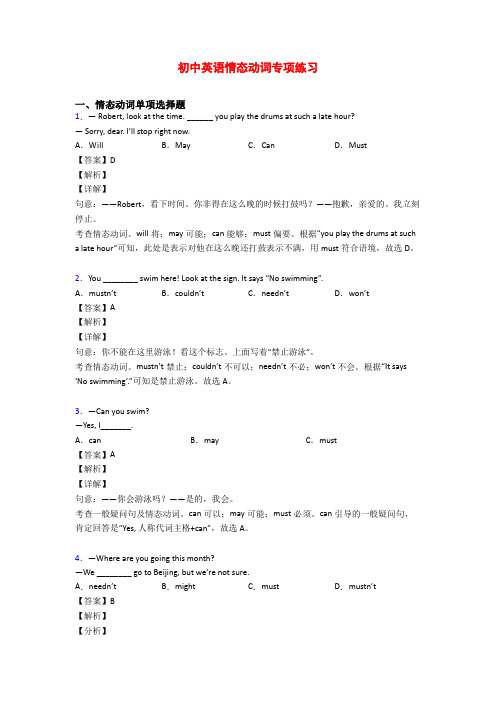
初中英语情态动词专项练习一、情态动词单项选择题1.— Robert, look at the time. ______ you play the drums at such a late hour?—Sorry, dear. I’ll stop right now.A.Will B.May C.Can D.Must【答案】D【解析】【详解】句意:——Robert,看下时间。
你非得在这么晚的时候打鼓吗?——抱歉,亲爱的。
我立刻停止。
考查情态动词。
will将;may可能;can能够;must偏要。
根据“you play the drums at such a late hour”可知,此处是表示对他在这么晚还打鼓表示不满,用must符合语境,故选D。
2.You ________ swim here! Look at the sign. It says “No swimming”.A.mustn’t B.couldn’t C.needn’t D.won’t【答案】A【解析】【详解】句意:你不能在这里游泳!看这个标志。
上面写着“禁止游泳”。
考查情态动词。
mustn’t禁止;co uldn’t不可以;needn’t不必;won’t不会。
根据“It says ‘No swimming’.”可知是禁止游泳。
故选A。
3.—Can you swim?—Yes, I_______.A.can B.may C.must【答案】A【解析】【详解】句意:——你会游泳吗?——是的,我会。
考查一般疑问句及情态动词。
can可以;may可能;must必须。
can引导的一般疑问句,肯定回答是“Yes, 人称代词主格+can”,故选A。
4.—Where are you going this month?—We ________ go to Beijing, but we’re not sure.A.needn’t B.might C.must D.mustn’t【答案】B【解析】【分析】句意:——这个月你们要去哪里?——我们可能去北京,但我们不确定。
初中英语情态动词专项练习
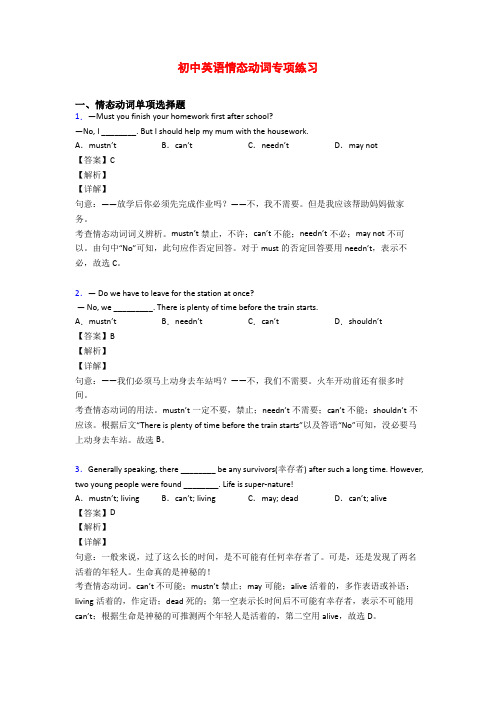
初中英语情态动词专项练习一、情态动词单项选择题1.—Must you finish your homework first after school?—No, I ________. But I should help my mum with the housework.A.mustn’t B.can’t C.needn’t D.may not【答案】C【解析】【详解】句意:——放学后你必须先完成作业吗?——不,我不需要。
但是我应该帮助妈妈做家务。
考查情态动词词义辨析。
mustn’t禁止,不许;can’t不能;needn’t不必;may not不可以。
由句中“No”可知,此句应作否定回答。
对于must的否定回答要用needn’t,表示不必,故选C。
2.— Do we have to leave for the station at once?— No, we _________. There is plenty of time before the train starts.A.mustn’t B.needn’t C.can’t D.shouldn’t【答案】B【解析】【详解】句意:——我们必须马上动身去车站吗?——不,我们不需要。
火车开动前还有很多时间。
考查情态动词的用法。
mustn’t一定不要,禁止;needn’t不需要;can’t不能;shouldn’t不应该。
根据后文“There is plenty of time before the train starts”以及答语“No”可知,没必要马上动身去车站。
故选B。
3.Generally speaking, there ________ be any survivors(幸存者) after such a long time. However, two young people were found ________. Life is super-nature!A.mustn’t; living B.can’t; living C.may; dead D.can’t; alive【答案】D【解析】【详解】句意:一般来说,过了这么长的时间,是不可能有任何幸存者了。
初中英语情态动词专项练习(附答案解析)
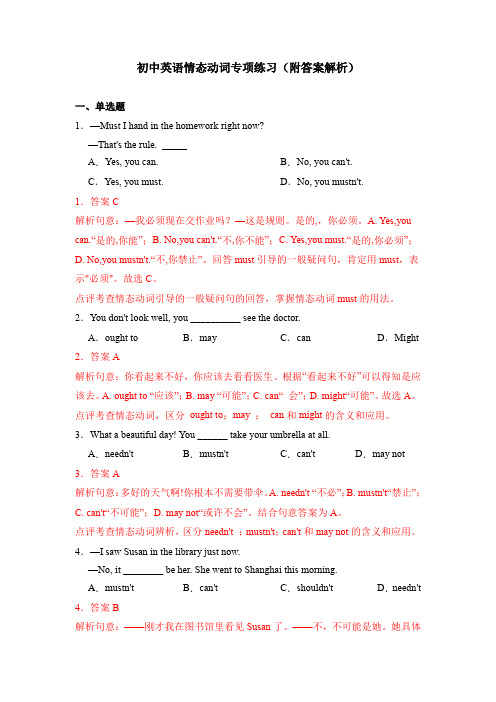
初中英语情态动词专项练习(附答案解析)一、单选题1.—Must I hand in the homework right now?—That's the rule.A.Yes, you can.B.No, you can't.C.Yes, you must.D.No, you mustn't.1.答案C解析句意:—我必须现在交作业吗?—这是规则。
是的,,你必须。
A. Yes,you can.“是的,你能”;B. No,you can't.“不,你不能”;C. Yes,you must.“是的,你必须”;D. No,you mustn't.“不,你禁止”。
回答must引导的一般疑问句,肯定用must,表示"必须"。
故选C。
点评考查情态动词引导的一般疑问句的回答,掌握情态动词must的用法。
2.You don't look well, you __________ see the doctor.A.ought to B.may C.can D.Might 2.答案A解析句意:你看起来不好,你应该去看看医生。
根据“看起来不好”可以得知是应该去。
A. ought to “应该”;B. may “可能”;C. can“ 会”;D. might“可能”。
故选A。
点评考查情态动词,区分ought to;may ;can和might的含义和应用。
3.What a beautiful day! You ______ take your umbrella at all.A.needn't B.mustn't C.can't D.may not 3.答案A解析句意:多好的天气啊!你根本不需要带伞。
A. needn't “不必”;B. mustn't“禁止”;C. can't“不可能”;D. may not“或许不会”。
初中英语情态动词专项训练题
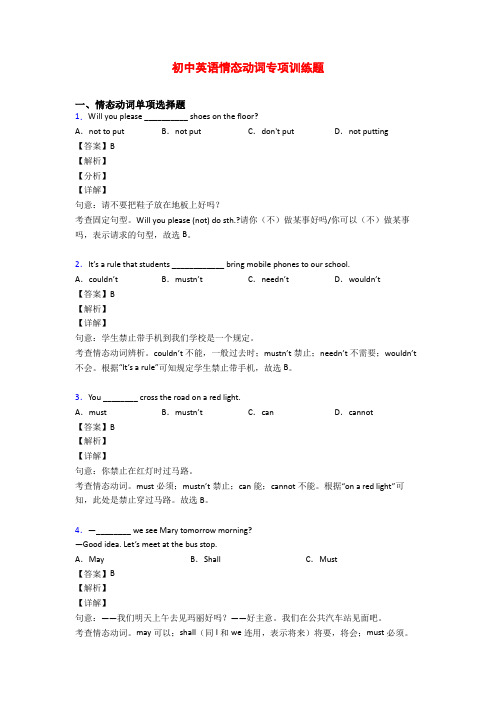
初中英语情态动词专项训练题一、情态动词单项选择题1.Will you please __________ shoes on the floor?A.not to put B.not put C.don't put D.not putting【答案】B【解析】【分析】【详解】句意:请不要把鞋子放在地板上好吗?考查固定句型。
Will you please (not) do sth.?请你(不)做某事好吗/你可以(不)做某事吗,表示请求的句型,故选B。
2.It’s a rule tha t students ____________ bring mobile phones to our school.A.couldn’t B.mustn’t C.needn’t D.wouldn’t【答案】B【解析】【详解】句意:学生禁止带手机到我们学校是一个规定。
考查情态动词辨析。
couldn’t不能,一般过去时;mustn’t禁止;needn’t不需要;wouldn’t 不会。
根据“It’s a rule”可知规定学生禁止带手机,故选B。
3.You ________ cross the road on a red light.A.must B.mustn’t C.can D.cannot【答案】B【解析】【详解】句意:你禁止在红灯时过马路。
考查情态动词。
must必须;mustn’t禁止;can能;cannot不能。
根据“on a red light”可知,此处是禁止穿过马路。
故选B。
4.—________ we see Mary tomorrow morning?—Good idea. Let’s meet at the bus stop.A.May B.Shall C.Must【答案】B【解析】【详解】句意:——我们明天上午去见玛丽好吗?——好主意。
我们在公共汽车站见面吧。
考查情态动词。
may可以;shall(同I和we连用,表示将来)将要,将会;must必须。
初中语法:情态动词知识点专项练习
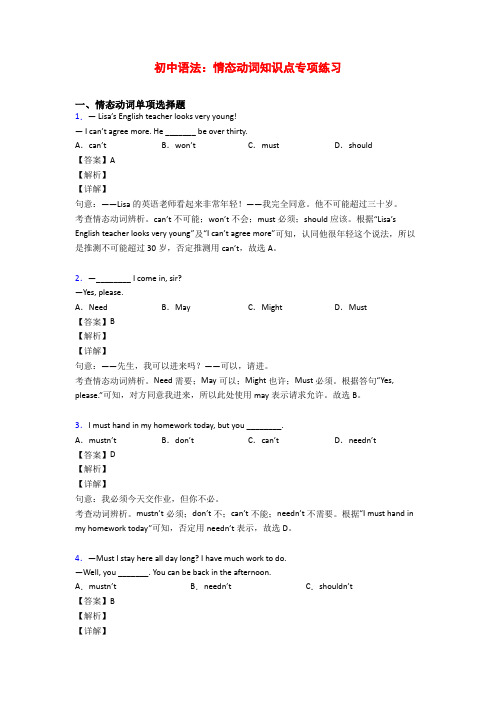
初中语法:情态动词知识点专项练习一、情态动词单项选择题1.—Lisa’s English teacher looks very young!—I can’t agree more. He _______ be over thirty.A.can’t B.won’t C.must D.should【答案】A【解析】【详解】句意:——Lisa的英语老师看起来非常年轻!——我完全同意。
他不可能超过三十岁。
考查情态动词辨析。
can’t不可能;won’t不会;must必须;should应该。
根据“Lisa’s English teacher looks very young”及“I can’t agree more”可知,认同他很年轻这个说法,所以是推测不可能超过30岁,否定推测用can’t,故选A。
2.—________ I come in, sir?—Yes, please.A.Need B.May C.Might D.Must【答案】B【解析】【详解】句意:——先生,我可以进来吗?——可以,请进。
考查情态动词辨析。
Need需要;May可以;Might也许;Must必须。
根据答句“Yes, please.”可知,对方同意我进来,所以此处使用may表示请求允许。
故选B。
3.I must hand in my homework today, but you ________.A.mustn’t B.don’t C.can’t D.needn’t【答案】D【解析】【详解】句意:我必须今天交作业,但你不必。
考查动词辨析。
mustn’t必须;don’t不;can’t不能;needn’t不需要。
根据“I must hand in my homework today”可知,否定用needn’t表示,故选D。
4.—Must I stay here all day long? I have much work to do.—Well, you _______. You can be back in the afternoon.A.mustn’t B.needn’t C.shouldn’t【答案】B【解析】【详解】句意:——我必须整天待在这儿吗?我有很多工作要做。
初中英语专项练习——情态动词(含答案)

初中英语专项练习——情态动词(含答案)一、单项选择1.---Our class wins the English speaking contest.---Congratulations! You ____ be very proud of it.A. canB. needC. wouldD. must2.People ____ cross the road if there is a red light on.A. mustn'tB. needn'tC. can'tD. may not3.You ____ park your car in front of the school gate.A. needn'tB. mustn'tC. mustD. may4.— May I put my bike here?— No, you ____. If you do, you may lose it.A. needn'tB. won'tC. mustn'tD. wouldn't5.— Susan, would you like to go hiking with us this afternoon?— I'd love to, but I ____ study for a test.A. mayB. have toC. canD. could6.—— Must I finish the work by 10 o'clock?—— No, you ____. You can finish it tomorrow.A. mustn'tB. won'tC. don't have toD. can't7.You ____ wear sports shoes when you climb a mountain.A. can'tB. shouldn'tC. mustn'tD. have to8.—— Would you like to go to the cinema with us after school?—— Sorry, I ____ do my homework first.A. mustB. canC. mayD. could9.Cars, buses and bikes ____ stop when the traffic light is red.A. canB. mustC. mayD. need10.It's raining harder and harder. I ____ stay at home and do some reading.A. have toB. mustC. shouldD. need11.It rains heavily, so we ____ stay at home.A. have toB. had toC. mustD. mustn’t12.---Where is your boss, Jack?---Well, I think he ____ in the office.A. can beB. must beC. can have beenD. mustn’t have been13.Hurry up. He ____ for us at the station.A. must waitB. must be waitingC. should waitD. should waiting14.— David, turn off your computer now! You ____ play on it too long.— I see, mum.A. couldn'tB. mustn'tC. wouldn'tD. needn't15.You ____ wash your hands before meals. It is good for your health.A. mayB. canC. have toD. must二、完形填空Nick is a middle school student. He studies hard, 1 he is very naughty (淘气的), too. In summer holidays, he often plays with other friends in the park. The park is near his house. One day he 2some new clothes as his birthday presents. He felt very 3. "Mum, can I go cycling(骑车) with my friends? I want them to 4my new clothes," asked Nick. "Yes, please keep your clothes 5," said mother. She was doing some cooking. "We'll 6 supper after you come back." Two hours later, Nick went home 7 supper. "Why are your clothes so 8 ?" asked his mother."I'm sorry, Mum," 9 Nick. "I had no time to 10 my clothes when I fell off the bike."1. ____A. andB. butC. soD. because2. ____A. boughtB. broughtC. hadD. got3. ____A. happyB. sadC. angryD. well4. ____A. meetB. looksC. seeD. watch5. ____A. cleanB. niceC. blueD. big6. ____A. keepB. getC. haveD. has7. ____A. withB. ofC. toD. for8. ____A. dirtyB. cleanC. newD. old9. ____A. toldB. askedC. saidD. answered10. ____A. take onB. take offC. take inD. take up三、阅读理解Jimmy is at school now. He is in the classroom, but he can't find his schoolbag. Where is it? Is it lost? Oh, no! It is in his room. He doesn't take (带) it to the school. He calls his sister Sally and asks her to take(带)his school things to the school. Here are his school things.His schoolbag is on the chair. Under the chair is his pencil box. His notebook is on the desk. His dictionary is on the bed. His pencils aren't inthe pencil box. They're on the sofa.Oh, Sally, don't forget(忘记) to take his baseball. Jimmy always plays baseball after school. But where is his baseball? Oh, it's under the table.1. ____Where is Jimmy's schoolbag?A. In his room.B. In the lost and found box.C. In the classroom.D. We don't know.2. Sally is Jimmy's ____ .A. motherB. sisterC. cousinD. friend3. Jimmy' s pencil box is ____ .A. on the deskB. in the schoolbagC. on the sofaD. under the chair4. ____What is on the sofa?A. Sally’s pencils.B. Jimmy’s pencils.C. Sally’s notebook.D. Jimmy' s notebook.5. ____What does Jimmy do after school?A. He calls his sister.B. He calls his mother.C. He plays baseball.D. He plays computer games.参考答案1.【答案】D【解析】此题考查情态动词,表示肯定推测,故选D。
初中英语情态动词专项练习
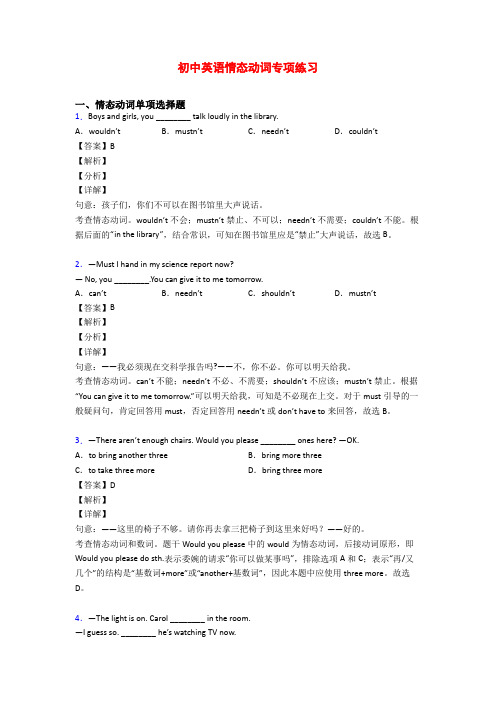
初中英语情态动词专项练习一、情态动词单项选择题1.Boys and girls, you ________ talk loudly in the library.A.wouldn’t B.mustn’t C.needn’t D.couldn’t【答案】B【解析】【分析】【详解】句意:孩子们,你们不可以在图书馆里大声说话。
考查情态动词。
wouldn’t不会;mustn’t禁止、不可以;needn’t不需要;couldn’t不能。
根据后面的“in the library”,结合常识,可知在图书馆里应是“禁止”大声说话,故选B。
2.—Must I hand in my science report now?— No, you ________.You can give it to me tomorrow.A.can’t B.needn’t C.shouldn’t D.mustn’t【答案】B【解析】【分析】【详解】句意:——我必须现在交科学报告吗?——不,你不必。
你可以明天给我。
考查情态动词。
can’t不能;needn’t不必、不需要;shouldn’t不应该;mustn’t禁止。
根据“You can give it to me tomorrow.”可以明天给我,可知是不必现在上交。
对于must引导的一般疑问句,肯定回答用must,否定回答用needn’t或don’t have to来回答,故选B。
3.—There aren’t enough chairs. Would you please ________ ones here? —OK.A.to bring another three B.bring more threeC.to take three more D.bring three more【答案】D【解析】【详解】句意:——这里的椅子不够。
请你再去拿三把椅子到这里来好吗?——好的。
考查情态动词和数词。
初中语法:情态动词知识点专项练习题

初中语法:情态动词知识点专项练习题一、情态动词单项选择题1.You’d better________ the light when your hands are wet.A.put in B.to put up C.not put in D.not put up【答案】C【解析】【分析】【详解】句意:你手湿的时候最好不要安装灯。
考查非谓语动词及动词短语的用法。
put in安装(设备);put up张贴。
根据“You’d better… the light when your hands are wet”可知,手湿的时候不要安装灯,had better not do sth“最好不要做某事”,故选C。
2.—May I have some wine to drink?—No, you ________. You have to drive home later.A.mustn’t B.needn’t C.can’t D.may not【答案】A【解析】【详解】句意:——我可以喝点酒吗?——不,你不能。
你一会儿得开车回家。
考查情态动词。
mustn’t不可以,表禁止;needn’t不需要;can’t不可能;may not可能不是。
上句询问能否喝点酒,结合“drive home”可知,开车不能喝酒,表禁止,故用mustn’t。
故选A。
3.A hard-working man ________ become a great scientist, but a great scientist ________ be a hard-working man.A.can’t; can B.may not; must C.can’t; must D.may not; can【答案】B【解析】【详解】句意:一个努力的人可能不会成为一位伟大的科学家,但一位伟大的科学家一定是一个努力的人。
考查情态动词表推测。
第一个空,can’t表示“不能”或“不可能”,may not表示“可能不”,根据语境可知,努力的人可能成为伟大的科学家,也可能不会成为,因此排除选项A和C;第二个空,must be表示“一定是”,can be表示“有时是、可以是”,根据题干前半句和but 转折可知,此空应用肯定推测,即must be,排除选项D。
- 1、下载文档前请自行甄别文档内容的完整性,平台不提供额外的编辑、内容补充、找答案等附加服务。
- 2、"仅部分预览"的文档,不可在线预览部分如存在完整性等问题,可反馈申请退款(可完整预览的文档不适用该条件!)。
- 3、如文档侵犯您的权益,请联系客服反馈,我们会尽快为您处理(人工客服工作时间:9:00-18:30)。
情态动词情态动词是一种本身有一定的词义,但要与动词原形及其被动语态一起使用,给谓语动词增添情态色彩,表示说话人对有关行为或事物的态度和看法,认为其可能、应该或必要等。
情态动词后面加动词原形。
情态动词有四类:①只做情态动词:must,can(could),may(might)……②可做情态动词又可做实义动词:need,will③具有情态动词特征:have(had,has) to,used to,ought to④情态动词表猜测:一肯一否三不定(must一肯,can not一否,may,might,could,三不定。
)注:mustn't代表强烈禁止 must表示主观,have to表示客观。
常用的有:can may could must have use .情态动词无人称和数的变化,情态动词后面跟的动词须用原形,否定式构成是在情态动词后面加 "not"。
个别情态动词有现在式和过去式两种形式,过去式用来表达更加客气,委婉的语气,时态性不强,可用于过去,现在或将来。
情态动词属非及物动词,故没有被动语态。
情态动词表推测的用法小结(一)情态动词表推测的三种句式1.在肯定句中一般用must (一定),can,could(可能),might /may(也许,或许)。
e.g:(1)He must/can/may,might know the answer to this question.他一定/可能/也许知道这个问题的答案。
(2)It is cold in the room. They must have turned off the heating.屋里很冷,他们肯定把暖气关了。
2.否定句中用can’t / couldn’t(不可能),may not/might not(可能不)。
e.g:(1)It can’t/couldn’t be the headmaster. He has gone to America.这不可能是校长,他去美国了。
(2)He may not/might not know the scientist.他也许不认识那位科学家。
3.疑问句中用can/could (能……?)。
e.g:(1).Could he have finished the task?他可能把任务完成了吗?注:以上三种句式中情态动词的语气按程度都是依次递减的。
Might,could并非may,can的过去式,而表示语气较为委婉或可能性较小。
(二)情态动词表推测的三种时态1.对将来情况的推测,用“情态动词 + 动词原形”。
e.g:(1).She must / may / might / could arrive before 5.5:00前她一定/可能/也许到。
2.对现在或一般情况的推测,用“情态动词+ be”,“情态动词+be doing”或“情态动词 + 动词原形”。
e.g:(1).He must / may / might / could be listening to the radio now. 他一定/可能/也许正在听收音机。
(2).He can’t ( couldn’t ) / may ( might ) not be at home at this tim e. 这个时候他不可能/可能不在家。
3.对过去情况的推测,用“情态动词 + have +过去分词”。
e.g:(1).It must / may / might / could have rained last night .The ground is wet.地湿了,昨晚肯定/可能/也许下雨了。
(2).The door was locked. He can ( could ) not / may ( might ) not have been at home .门锁着,他不可能/可能不在家。
注:情态动词 should /ought to表推测时,意为“想必会,理应……”但与“have +过去分词”连用时,则又可构成虚拟语气意为“本应该做某事却没做”。
例如:(4).It’s seven o’clock. Jack should/ough t to be here at any moment. 现在七点钟了,杰克理应随时到达。
(推测)(5).Tom should not /ought not to have told me your secret,but he meant no harm. (虚拟)汤姆本不该告诉我你的秘密,可是他并无恶意。
can 和could 表示推测的用法对现在或将来的推测,两者均可用,但can 通常只用于否定句或疑问句中,一般不用于肯定句,而could则可用于肯定句、否定句和疑问句;对过去的推测,应在 can,could 之后接动词的完成式,且此时can仍只用于否定句或疑问句,不用于肯定句;而could 则可用于各种句型。
如:Can [Could] this be true? 这能是真的吗Where can [could] he have gone? 他能到哪里去了呢She can’t [couldn’t] have left so soon. 她不可能走得这么早。
注:could后接动词的完成式,除表示对过去的推测外,还可表示过去没有实现的可能性(即某事本来可以发生,却没发生),或委婉地责备某人过去应该做某事而没有去做(此时不用can)。
如:You could have started a little earlier. 你本可早点动身的。
You needn’t have cooked it. We could have eaten it raw. 你其实可以不煮熟(它),我们(本来)可以生吃。
can 和could 表示允许的用法表示现在的允许时,若是请求别人允许自己做某事,两者均可用,但用could 语气更委婉;若是自己允许别人做某事,一般只用 can,而不用 could。
如:Can [Could] I come in? 我可以进来吗“Could [Can] I use your pen? ” “Yes,of course you can.” “我可以借用你的钢笔吗?”“当然可以。
”(不能说Yes,you could.)表示过去的允许时,若表示过去一般性允许(即表示某人随时都可以做某事),用could;若表示在过去某一特定情况下允许进行某一特定的活动,则不用could。
如:When I lived at home,I could watch TV whenever I wanted to. 我住在家里时,想什么时候看电影就可以什么时候看。
(一般性允许)I was allowed to see the film yesterday evening. 昨天晚上允许我去看了电影。
(特定的允许,不能用 could)can 和could 表示能力的用法can 表示现在的能力,could 表示过去的能力,要表示将来具备的能力通常 be able to 的将来时态。
其中要注意的是,could 表示过去的能力,通常只用于表示过去一般性能力,而不表示过去具体某次特定情形下能够做某事的能力。
如:他学习很努力,所以考试能及格。
误:He studied hard and could pass the exam.正:He studied hard and was able to pass the exam.注:若在否定句中没有以上限制,即couldn’t 可表示过去特定情况下的能力,如可说He studied hard but still couldn’t pass the exam.口诀:情态动词两特点动词原形接后面,说话语气较委婉。
can "能力"may"许可",must"责任"或"义务"。
否定回答needn’t换,"需要"need, dare"敢"。
should"应该",would"愿",have to"被迫"表客观。
情态动词专项练习题1. --- Where is Mary? --- She ____ in the library.A. should beB. must beC. can beD. must have been2. His room is dark. He must ____ to bed.A. goB. be goingC. have goneD. have been gone3. “Will your father stay home tonight?”“I’m not sure, He ____to work.”A. must goB. can goC. may be goneD. may be going4. “Where is Tom?”“He isn’t here I think he ____ have gone home.”A. mayB. mustC. mightD. A or B or C5. “I think Helen is at home.”“No, she ____ be at home, for she phoned me from the airport just five minutes ago.”A. m ustn’tB. needn’tC. ca n’tD. daren’t6. He’s late. What ____ have happened to him?A. canB. mayC. should D, must7. “ _____ he be watching TV now?”Yes, he _____ be watching TV now.”No, he _____ be watching TV now.”A. Must; ca n; mustn’tB. Can; must; can’tC. Must; mu st; can’tD. Can; can; mustn’t8. “____. He have left yesterday?”Yes, he ____ yesterday.”No, he ____ yesterday.”A. Must; must have left; can’t have leftB. Can; can have left; can’t have leftC. Ca n; must have left; can’t have leftD. May; must have left; shouldn’t have left9. You must be a writer, ____ you?A. mustn’tB. areC. mustD. aren’t10. You must have seen her yesterday, ____ you?A. mus tn’tB. haven’tC. didn’tD. don’t11. You must have seen her, ____ you?A. haven’tB. didn’tC. don’tD. A or B12. There was plenty of time. She ____ worried or hurried.A. mustn’t haveB. shouldn’t haveC. must beD. needn’t have13. I got up early, but I ____ so because I had no work to do that morning.A. mustn’t h ave doneB. didn’t need to doC. needn’t have do neD. can’t have done14. I ____ up early this morning. So I stayed in bed till 9 a. m.A. needn’t h ave gotB. didn’t need to getC. shouldn’t have gotD. can’t have got15. The flower is dead. I ____ it more water.A. will giveB. would have givenC. must giveD. should have given16. He ____ have come here yesterday, but he didn’t.A. couldB. shouldC. ought toD. A or B or C17. “Must he do it?”“No, he ____.”A. mustn’tB. needn’tC. doesn’t have toD. B or C18. “Need you go now?”“Yes, I ____.” “No, I ____.”A. need; needn’tB. must; needn’tC. may; mustn’tD. can; needn’t19. “May I borrow your bike?”“No, you ____.”A. mustn’tB. may notC. had better notD. can’t20. “Can I do it?”“No, you ____.”or “No, please ____.”A. can’t; doesn’tB. can’t; don’tC. can’t; can’tD. can’t; you don’t21. I missed the last bus, so I ____ go home on foot.A. mustB. have toC. mayD. had to22. We ____ hurry if we want to arrive in time.A. mustB. needC. mayD. have to23. He ought to have won the first prize, ____ he?A. oughtn’tB. shouldn’tC. mustn’tD. oughtn’t to24. He ____ get up early when he lived in the countryside.A. wouldB. used toC. mustn’tD. can’t25. My brother ____ be very naughty, and my sister ____ like reading.A. used to; wouldB. would; used toC. used to; used toD. would; would26. ____ you please pass on a message to him?A. DoB. ShallC. MayD. Will27. ____ we set off now?A. ShallB. WillC. WouldD. ought28. “____ he open the window?”Yes, please.”A. DoesB. willC. ShallD. Would29. I’ve told him many times, but he ____ listen to my advice.A. shall notB. won’tC. will notD. wouldn’t30. “Will you lend me a hand?”“Yes, I ____.”A. willB. shallC. canD. may31. Everyone ____ do his best for the modernization of China.A. will youB. don’t weC. shall weD. do you32. Let’s clean our room, ____?A. will youB. don’t weC. shall weD. do you33. Let us watch TV, ____?A. will youB. don’t weC. shall weD. do you34. Close the door after you, ____ you?A. don’tB. doC. shallD. will35. Every time he meets me, he ____ to me.A. smiledB. would smileC. will smileD. is smiling情态动词部分1-5 BCCDC 6-10 ABCDC 11-15 DDCBD 16-20 DDBDB 21-25 DDDDC 26-30 DACDA 31-35 CCADC。
